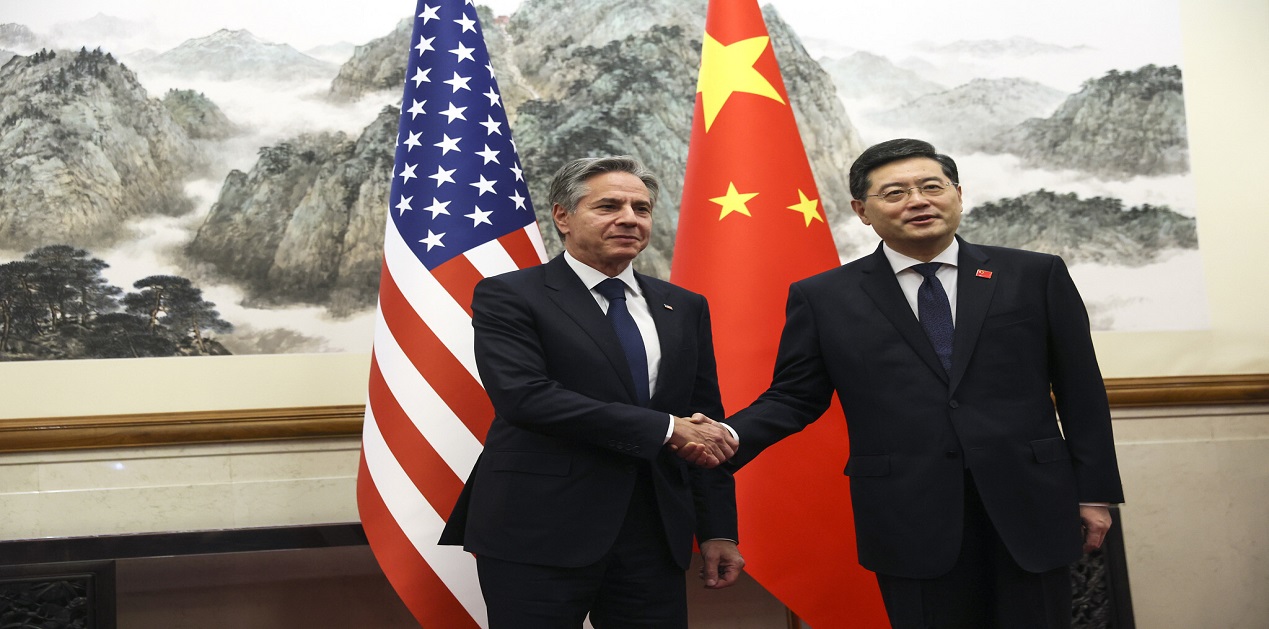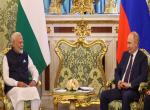The Western media, in sharp contrast to China’s tightly controlled official media, seems to have gushed at the apparent success of US Secretary of State Anthony Blinken's visit to China on June 18-19. China’s official media, in contrast, afforded low-key coverage to the visit, which they pointed out had been sought by the US. Successive articles in China’s official media have cautioned that the US was advertising a so-called desire to improve ties when in reality it wanted to contain China. The special, warm welcome accorded to Indian Prime Minister Modi and the speeches during his recent visit to the US will have reinforced Chinese suspicions. A closer look at the official accounts of Blinken’s meetings in China reveal the differences in the content and tone of the respective statements issued after the meetings, suggesting that the outcome of this and similar future contacts are likely to beat variance with popular expectations.
The tone for Blinken’s visit was set with his reception at the airport by a mid-level Foreign Ministry official. Just two days earlier signalling an attempt to bypass the government and establish direct links with US hi-tech, Chinese President Xi Jinping and Bill Gates discussed cooperation in AI in a televised meeting. During his two day halt in Beijing, Blinken had a five and a half hour meeting on June 18 with Chinese State Councilor and Foreign Minister Qin Gang at the Diaoyutai State Guest House. This was followed by a 35-minute meeting with Wang Yi, the senior most Chinese diplomat who is currently a Politburo member and Director of the Central Committee Foreign Affairs Office. The Chinese official statement issued after the meeting with Blinken showed that during the meeting Wang Yi sternly enunciated the issues of concern to China. Finally, giving barely 45 minutes notice -- reminiscent of the style of the late Chairman Mao's style of functioning -- Blinken was informed that he would be received by Chinese President Xi Jinping. Official statements released by both sides after Blinken’s meeting with Xi Jinping indicated that Xi Jinping appeared satisfied with the visit describing them as "substantive" and "constructive".
While Xi Jinping has met all earlier visiting US Secretaries of State since Henry Kissinger, like Pompeo and John Kerry, given that US-China relations are currently at an all-time low, his meeting with Blinken undoubtedly sent out a couple of messages. These were tailored equally for the foreign as well as domestic audiences. To the foreign audience the message Xi Jinping sought to convey was that it was the US that had damaged the bilateral relationship and was now trying to contain China’s growth with its sanctions on hi-tech sales and exports and attempts to create an alternative “trusted” secure supply chain. By raising issues like that of Taiwan, the US was attempting to pressurise it and place obstacles in the improvement of relations.
Chinese Foreign Minister Qin Gang in his meeting with Blinken pointed out that “the Taiwan question is at the core of China's core interests, it is the most significant issue in China-U.S. relations, and it is also the most prominent risk”. Qin Gang put forward specific demands on issues concerning China's core interests and major concerns, including the Taiwan question. Qin Gang pointed out that the Taiwan question is at the core of China's core interests; it is the most significant issue in China-U.S. relations, and itis also the most prominent risk. He urged the U.S. to adhere to the various agreements and truly implement its commitment not to support "Taiwan independence". The two agreed to effectively manage differences, and promote dialogue, communication, and cooperation. They agreed to maintain high-level exchanges and Qin Gang accepted Blinken’s invitation to visit the United States.
Wang Yi, presently the senior most Chinese diplomat, was more direct in his discussions with Blinken. Stating that the priority is to stabilize China-US relations, he emphasized that the “root cause of the current downturn in China-U.S. relations lies in the U.S. side's erroneous understanding of China, which has resulted in misguided policies toward China”. He said the two countries need to “work together to find the right way for China and the US to coexist in the New Era” -- a phrase that many Chinese have interpreted as China placing itself on par with the US. Listing China’s demands, Wang Yi insisted that the US “stop hyping up the "China threat theory", lift its illegal unilateral sanctions against China, abandon the suppression of China's technological development, and refrain from interfering in China's internal affairs at will”. Wang Yi also gave Blinken a detailed analysis of the Taiwan question. He emphasised that “safeguarding national unity is always the core of China's core interests, and it is related to the destiny of all Chinese people and the unwavering historical mission of the Communist Party of China”. Laying down a clear Red Line, he asserted that “On this issue China has no room for any compromise or concession”. He called on the US to “truly adhere to the One-China principle”.
The message to the domestic audience in China was similarly clear. There has been criticism inside China since the 19th Party Congress in 2017 of Xi Jinping’s handling of the policy towards the US. In recent months and accompanied by official admissions of high graduate unemployment, rising unemployment in the rural and other sectors, and continuous reports of closure of businesses of Chinese entrepreneurs, China’s official media has published articles pointing to the need for improvement in China-US bilateral ties. The latter are crucial for the revival of China’s export-dependent economy and the country’s economic development. China’s exports to the US dropped by 17 per cent last year and are likely to decline further this year. By meeting Blinken, Xi Jinping indicated that he favoured an improvement in relations thereby addressing domestic criticism that he was to blame for the deterioration in ties. At the same time he conveyed to the more ‘nationalist hard-line’ elements that he will not yield ground and make no concessions. This he did by reiterating the clear ‘Red Line’ on the Taiwan issue drawn by Wang Yi. This message was underscored by China’s blunt refusal to establish a crisis hot line between the two militaries. China’s controlled official media has especially since the past couple years been consistently blaming the US for the deterioration in bilateral ties and raising tensions in the region by its actions.
Within a day of Blinken’s departure, the authoritative Xinhua news agency published (June 21) a report titled 'U.S. needs to honour commitments with actions to improve ties with China to avert the downward spiral of their relationship and bring it back on the track of stable development'. This was republished by China’s official English-language Beijing Review. It seemed to strike a somewhat conciliatory tone and quoted Blinken’s remarks that “the United States stands by the commitments made by President Joe Biden, namely that the United States does not seek a new Cold War, it does not seek to change China's system, its alliances are not directed at China, it does not support "Taiwan independence," and it does not seek conflict with China.' The Beijing Review assured: “China respects U.S. interests and does not seek to challenge or displace the United States”. Restating China’s concerns though, it added in the same vein that “the United States needs to respect China and must not hurt China's legitimate rights and interests. The U.S. should stop playing up the so-called "China threat," lift illegal unilateral sanctions against China, stop suppressing China's scientific and technological advances, and stop interfering in China's internal affairs”. In an apparent attempt to keep the dialogue going, the Chinese Foreign Ministry deleted (June 22) from the official transcript its spokesperson’s sharp riposte to US President Biden calling Xi Jinping a “dictator”.
Though the Chinese media, including the People’s Daily, Guangming Daily and the state-owned China Central Television gave low-key coverage to the visit, it was closely watched by the Chinese. A number of comments were posted on China’s social media platforms. There were many posts that expressed doubts about the outcome and an almost equal number that were more optimistic. For example, Hu Zhanhao, a well-known nationalist Chinese 'influencer’ who also serves on the Hubei Provincial Committee of the Chinese People’s Political Consultative Conference, observed that the meeting between the “Chinese head of state and Blinken is a pleasant surprise!” Saying that the meeting would not have occurred unless the US made significant political commitments, he questioned US intentions and asked whether “the US will not truly turn away from evil and pursue a better path?”
Chinese experts also commented on the visit:
- Yan Xuetong, Director of the Institute of International Relations, Tsinghua University, said (June 20): “As long as the US maintains its ‘small yard, high fence’ policy, the relationship between China and the US will essentially be characterised by ‘more conflict than cooperation’.
- Wu Xinbo, Director of the Institute of International Studies and Director of the Center for American Studies, Fudan University: “Blinken's visit to China has been positive, but no breakthroughswere achieved.”
- Ms. Shao Yuqun, Director of the Institute for Taiwan, Hong Kong and Macao Studies and researcher at the Centre for American Studies, Shanghai Institutes for International Studies (SIIS) said: “While the outcomes of Blinken's visit to China exceeded expectations, leading to temporary bilateral tension easing, U.S. strategic goals, policies, and approach to China are still characterized by a zero-sum mentality. This mindset is expected to continue causing various disturbances in China-U.S. relations.”
- Zhang Zhixin, Associate Researcher, Institute of American Studies, China Institutes of Contemporary International Relations (CICIR), said (June 19): “This visit may go some way to reducing tensions between both countries. However, as long as the hostility between them does not subside, the situation will remain the same, with good talks across the table, but confrontation when away from it.”
li>Zhu Feng, Director of the School of International Studies, Nanjing University said (June 20): “Based on the official statements made by both sides, I think Blinken's visit has been, generally speaking, very positive … [However,] it is unrealistic to expect any substantial improvement in Sino-US relations in the short term.”
Blinken’s visit is transparently an attempt to reduce tensions, but without offering any substantive proposals. It might have been intended to assuage US business, but by itself it will not alleviate the deep suspicions of the Chinese leadership. While Xi Jinping’s meeting with Blinken is being interpreted as a positive sign, it has not been accompanied by any move by the Chinese to ease the strain in the relationship. On the contrary, China has yielded no ground, offered no concessions, reasserted its national ambitions, and placed the entire blame for the deterioration in relations on the US. Beijing has additionally indicated that the US should treat it on an equal footing. Chinese leaders, including Xi Jinping, are convinced that the US is intent on containing China and bringing about the downfall of the Chinese Communist Party (CCP) and this will complicate relations. The special welcome accorded to India’s Prime Minister Modi and the major bilateral agreements signed during his recent visit to the US will reinforce Chinese suspicions.
(The paper is the author’s individual scholastic articulation. The author certifies that the article/paper is original in content, unpublished and it has not been submitted for publication/web upload elsewhere, and that the facts and figures quoted are duly referenced, as needed, and are believed to be correct). (The paper does not necessarily represent the organisational stance... More >>
Image Source: https://static.timesofisrael.com/www/uploads/2023/06/AP23169255128519.jpg?_gl=1*1j11glg*_ga*MTA3MTYyNjg1Ni4xNjg4NDQ2Mjgx*_ga_RJR2XWQR34*MTY4ODQ0NjI4MC4xLjAuMTY4ODQ0NjI4MC4wLjAuMA..











Post new comment